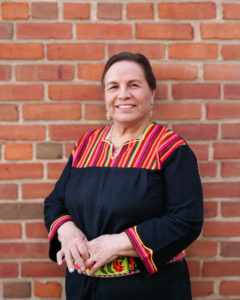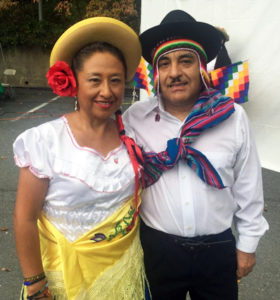Wheaton Conversations: Bolivian Ritual & Dance
with artists Julia Garcia & Maria Mayda
Watch the April 22, 2021 recording above
Join us for an exciting conversation with Bolivian artists Julia Garcia and Maria Mayda—uncovering the unique stories behind the Bolivian rituals and dances in the context of Bolivian and, more broadly, Andean traditional culture. Since ancient times, the people in the region have maintained a distinct way of connecting and reconnecting with nature, with souls of the departed, the gods through various rituals, and through dances organized to follow the movement of the Sun-Tayta (Father Sun).
Julia Garcia will discuss in detail the Q’oa and Ch’alla, a ritual that honors Pachamama (Mother Earth) and Mast’aku (the Offering Table for the “Day of the Dead”). Both aim at maintaining balance and harmony between humans and nature-based Ayni – “to give and to receive.”
Explore with Maria Mayda the rich traditions of Bolivian ceremonial folk dances—those that have the power to renew the universe’s relationship with humans, resolve conflicts and strengthen community ties, as well as the Mestizo dances that present a mixture of Native and Spanish symbolism, and the trans-cultural dances that combine both Native and African elements—reflecting a narrative about the colonial oppression through satire and parody.
This event is part of “Wheaton Conversations,” a new virtual series highlighting select artists with ties to WheatonArts! To see the full schedule of conversations, Click Here.

Julia Garcia was born in Cochabamba, Bolivia. She explains, “I learned from my ancestors the importance of living in harmony and equilibrium with La Pachamama (Mother Earth), where every species and living entity is important. My first language is Quechua, and I learned Spanish in elementary school”.
In 1972 Julia Garcia graduated from the Teachers School at the Catholic University San Pablo (Bolivia). She became a secondary school teacher in English, French, and Quechua languages. Garcia received a Post-Graduate Special Education Degree in Educational Psychology from Franz Tamayo University, Bolivia. After moving to the U.S., she became a Spanish and Quechua teacher in Arlington, Virginia.
Since 1997, Julia Garcia has served as Director of the “Sociedad Cultural Tradiciones Bolivianas,” an organization created to assist with preserving and presenting rituals, traditional costumes, music, and dances of Bolivia. Through the organization, she has dedicated her life to sharing the richness of her native language (Quechua) and the Bolivian traditions and culture with the world through various displays, workshops, seminars, storytelling, ritual demonstrations, and performances.
Julia is a Virginia master artist in Andean ceremonial traditions and had several apprentices through the state folk arts apprenticeship program. Over the years, she has worked with various institutions on projects featuring traditional Bolivian culture, including the National Museum of the American Indian, the Virginia Foundation for the Humanities, the Global Language Network, libraries, and arts organizations.

Maria Mayda is a Bolivian-born dancer, choreographer, and Dance Director of the “Tradiciones Bolivianas” Dance Company, VA. She creates choreographies for hers and other Bolivian dance groups in the area featuring the three major Bolivian dance types – – the ritual Native folk dances, the Mestizo dances, and the Trans-cultural dances. Maria was born in a region where the Native folk dances were the dominant dance forms. She has exquisite expertise with them, especially with the “Tinku” Native folk dance.
Maria Mayda’s choreographies won 1st place at the “Tinku Contest, 2010,” and her works were selected to be presented for the 2010 A.W.A.R.D. Maria’s interpretation of Bolivian folk dances is featured through stage presentations, street parades, and concert venues in the metropolitan areas of Pennsylvania, New York, and Canada.
Thank you to our sponsor, PNC Arts Alive!


